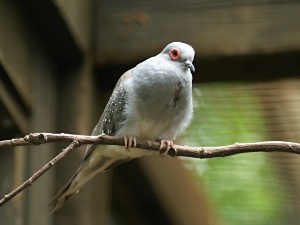
Suffering from an illness is not a fun experience for anyone, watching someone or something that you love suffering from an illness can be a worse experience whether it’s a human family member or an animal family member. All living things can fall prey to becoming sick, pets alike. Knowing what illnesses can affect your pet can empower you to take them to the vet in good time. This article goes over some diamond dove illnesses you should look out for
There are many illnesses that diamond doves can suffer from, these include pesky mites, worms, canker and respiratory diseases. If home remedies aren’t helping your doves condition then it would be best to take it to the vet
Table of Contents
Diamond dove illnesses that you should out for:
A diamond dove can be affected by a variety of external or internal ailments. The most common ailments are parasites that deprive the dove of necessary body supplies, resulting in weakness or death. Common diamond dove illnesses include:
Pesky mites: Mites can bite any part of the bird’s body, these bites leave red and swollen raised bite marks on the skin of the bird
Worms: Doves can get worms from eating infected droppings, earthworms and even slugs. Worms that affect doves include stomach wall worms, roundworms and tapeworms
Canker: Tiny organisms called protozoans cause canker in doves, canker causes breathing problems, weight loss, diarrhea, bleeding from the mouth and cloaca, lethargy and can result in death
Respiratory disease: These are extremely contagious among birds and can affect the lungs, sinuses, air sacks and other parts of the bird’s respiratory system. Some symptoms that you should look out for include laboured breathing, an open mouth while breathing and not wanting to eat. These diseases can be cashed by mites, fungi and bacteria
How can I help my sick dove?
A sick dove can be distressing to a pet owner. However, it is important to remain calm so that you may determine the best course of action. Confirm the dove is sick and not just tired or at rest through careful observation. Some signs of illness are breathing with its beak open, fluffed feathers (bad ‘feather’ day), sluggishness, and a hanging head.
Keep the dove warm and well fed which helps it regain lost energy. Avoid situations that will activate the dove’s fight or flee mode, as this will aggravate the spread of disease or weakness in its body.
When should I take my diamond dove to the vet?
If observe your pet dove before any signs of illness show up then you will be quick to notice abnormal dove behaviour and take quick action before it becomes a fatal situation. Due to the dove’s small size, it is likely for an infection to spread through its body faster than in a human being. Signs of a sick dove should thus be treated with urgency. Take your diamond dove to the vet when you observe extended abnormal bad behaviour like exhaustion, abnormal feeding, messy feathers, abnormal droppings or half-closed eyes.
What is the lifespan of a diamond dove?
A diamond dove can live between ten to fourteen years long, this is dependent on how well you care for it. Keep the dove clean, disease-free, and well-fed to extend its lifetime. You do well to carry out specific research about your diamond dove’s care to know best practices that will lead to a long life span. You may find that your intuitive care habits blend with the tasks you have to accomplish during your dove care routine.
What are the signs of a bird dying?
The earliest sign of a bird dying is unkempt feathers. This sign is easy to spot with one look as the bird would normally have a smooth coat of feathers that are aligned to its body. Being creatures of flight, birds instinctively ensure that their feathers are aligned to their aerodynamic design.
Fluffed up or dropping feathers, indicate the bird is unwell and will not be able to fly. That makes it more likely to be attacked by predators. In the wild, a flock of birds may eject such a bird from the flock to avoid attracting predators. Instinctively, a dove may try to obscure an ailment to avoid being ejected from your care.
Other signs that a bird is dying will include discharge from the eyes or beak, erratic feeding and drinking, little to no movement, and abnormal droppings.
Urgently but gently take the dove to a vet when you notice signs of ailments and be open to the fact that some dove ailments are not reversible beyond a certain point.
Conclusion:
In conclusion, some common dove ailments include pesky mites, worms, canker and respiratory diseases. Take your dove to a vet if you suspect it has any of these illnesses. If the bird is healthy expect it to live for 10-14 years.
If you enjoyed this article then you may also be interested in other bird related articles. Here are some articles that you may be interested in: What do baby doves eat? All you need to know, Do doves coo at night?, Male diamond dove pecking female, why and what to do, Do female doves bow and coo?, What do baby collared doves eat?

